新概念英语第二册听力及翻译Lesson 26
新概念第二册课文翻译及学习笔记【Lesson25、26、27】
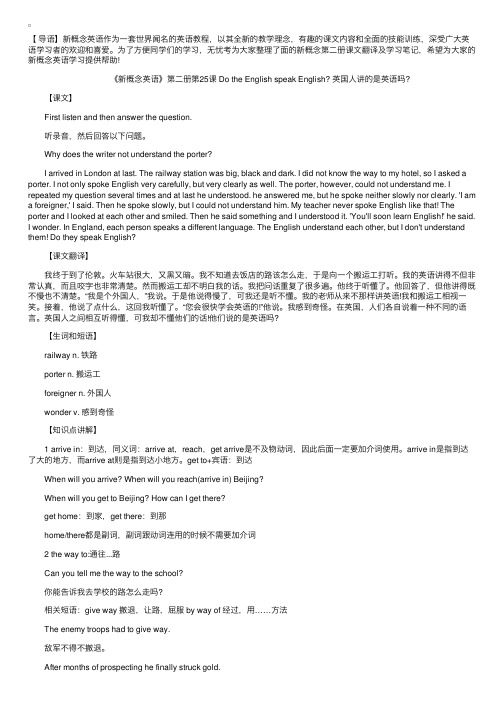
【导语】新概念英语作为⼀套世界闻名的英语教程,以其全新的教学理念,有趣的课⽂内容和全⾯的技能训练,深受⼴⼤英语学习者的欢迎和喜爱。
为了⽅便同学们的学习,⽆忧考为⼤家整理了⾯的新概念第⼆册课⽂翻译及学习笔记,希望为⼤家的新概念英语学习提供帮助!《新概念英语》第⼆册第25课 Do the English speak English? 英国⼈讲的是英语吗?【课⽂】First listen and then answer the question.听录⾳,然后回答以下问题。
Why does the writer not understand the porter?I arrived in London at last. The railway station was big, black and dark. I did not know the way to my hotel, so I asked a porter. I not only spoke English very carefully, but very clearly as well. The porter, however, could not understand me. I repeated my question several times and at last he understood. he answered me, but he spoke neither slowly nor clearly. 'I am a foreigner,' I said. Then he spoke slowly, but I could not understand him. My teacher never spoke English like that! The porter and I looked at each other and smiled. Then he said something and I understood it. 'You'll soon learn English!' he said.I wonder. In England, each person speaks a different language. The English understand each other, but I don't understand them! Do they speak English?【课⽂翻译】我终于到了伦敦。
(完整word版)新概念英语第二册课文及翻译
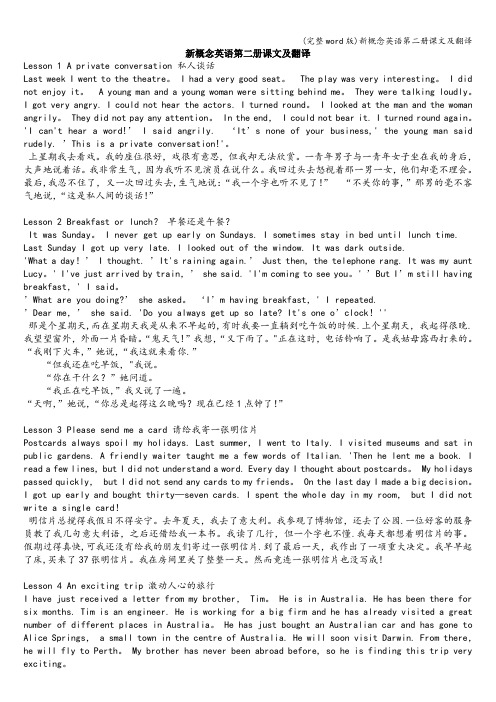
新概念英语第二册课文及翻译Lesson 1 A private conversation 私人谈话Last week I went to the theatre。
I had a very good seat。
The play was very interesting。
I did not enjoy it。
A young man and a young woman were sitting behind me。
They were talking loudly。
I got very angry. I could not hear the actors. I turned round。
I looked at the man and the woman angrily。
They did not pay any attention。
In the end, I could not bear it. I turned round again。
'I can't hear a word!’ I said angrily. ‘It’s none of your business,' the youn g man said rudely. ’This is a private conversation!'。
上星期我去看戏。
我的座位很好,戏很有意思,但我却无法欣赏。
一青年男子与一青年女子坐在我的身后,大声地说着话。
我非常生气,因为我听不见演员在说什么。
我回过头去怒视着那一男一女,他们却毫不理会。
最后,我忍不住了,又一次回过头去,生气地说:“我一个字也听不见了!”“不关你的事,”那男的毫不客气地说,“这是私人间的谈话!”Lesson 2 Breakfast or lunch?早餐还是午餐?It was Sunday。
I never get up early on Sundays. I sometimes stay in bed until lunch time. Last Sunday I got up very late. I looked out of the window. It was dark outside.'What a day!’ I thought. ’It's raining again.’ Just then, the telephone rang. It was my aunt Lucy。
新概念英语-第二册-Lesson-26
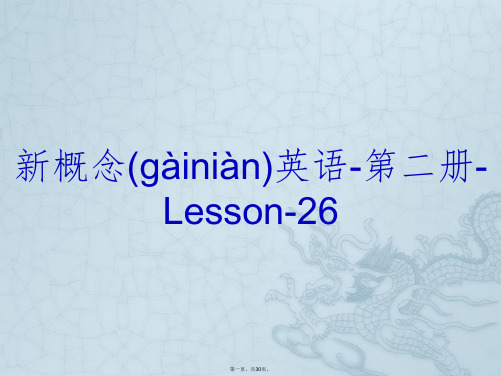
pretend pattern
v. 假装 n. 图案
curtain material
n. 窗帘,幕布 n. 材料
appreciate v. 鉴赏
no. 是否 v. 悬挂,吊
critically adv. 批评地 upside down 上下颠倒2地
They pretended to have been married.
6
第六页,共30页。
★pattern n. 图案(tú àn) ① n. 图案(tú àn) You can make a dress from this paper pattern. ② n. 模式, 典范
★curtain n. 窗帘,门帘 ring up / down the curtain
Beijing .
Beijing is larger than any city in China. Beijing is larger than any other city in China.
1.要注意比较的事物的前后(qiánhòu)一致性。
2.用比较级表达最高级的时候,如果是A个体
I looked at it again. She was right! It was! 13
第十三页,共30页。
参考译文: 我是个学艺术的学生, 画了很多画. 有很多人装 成很懂现代艺术的样子(yàng zi), 总是告诉你一 幅画的 “意思〞 是什么. 当然, 有很多画是什么 “意思〞 也没有的. 它们就是些好看的图案, 我 们喜爱它们就像我们喜欢漂亮的窗帘布一样. 我 觉得小孩子们往往比任何人都更能欣赏现代绘画, 他们观察到的东西更多. 我的妹妹只有7岁, 但她 总能说出我的画是好还是坏. 昨天她到我房里来 了.
新概念英语第二册课后习题答案详解 26-30
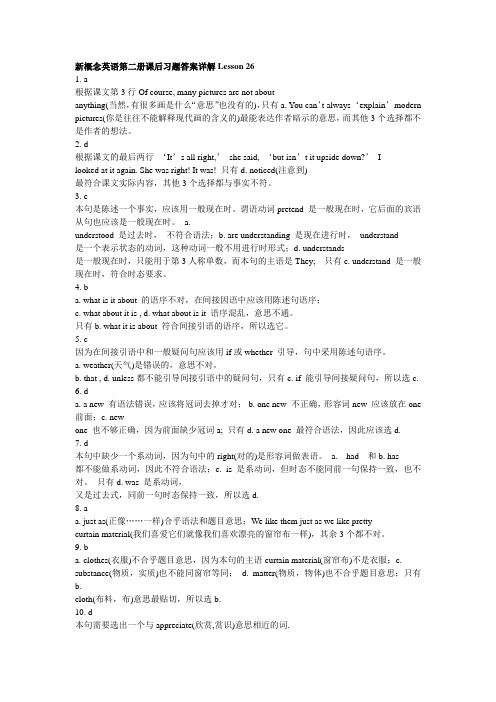
新概念英语第二册课后习题答案详解Lesson 261. a根据课文第3行Of course, many pictures are not aboutanything(当然,有很多画是什么“意思”也没有的),只有a. You can’t always ‘explain’modern pictures(你是往往不能解释现代画的含义的)最能表达作者暗示的意思,而其他3个选择都不是作者的想法。
2. d根据课文的最后两行‘It’s all right,’she said, ‘but isn’t it upside down?’Ilooked at it again. She was right! It was! 只有d. noticed(注意到)最符合课文实际内容,其他3个选择都与事实不符。
3. c本句是陈述一个事实,应该用一般现在时。
谓语动词pretend 是一般现在时,它后面的宾语从句也应该是一般现在时。
a.understood 是过去时,不符合语法;b. are understanding 是现在进行时,understand是一个表示状态的动词,这种动词一般不用进行时形式;d. understands是一般现在时,只能用于第3人称单数,而本句的主语是They; 只有c. understand 是一般现在时,符合时态要求。
4. ba. what is it about 的语序不对,在间接因语中应该用陈述句语序;c. what about it is ,d. what about is it 语序混乱,意思不通。
只有b. what it is about 符合间接引语的语序,所以选它。
5. c因为在间接引语中和一般疑问句应该用if或whether 引导,句中采用陈述句语序。
a. weather(天气)是错误的,意思不对。
b. that , d. unless都不能引导间接引语中的疑问句,只有c. if 能引导间接疑问句,所以选c.6. da. a new 有语法错误,应该将冠词去掉才对;b. one new 不正确,形容词new 应该放在one 前面;c. newone 也不够正确,因为前面缺少冠词a; 只有d. a new one 最符合语法,因此应该选d.7. d本句中缺少一个系动词,因为句中的right(对的)是形容词做表语。
新概念英语第二册第26课
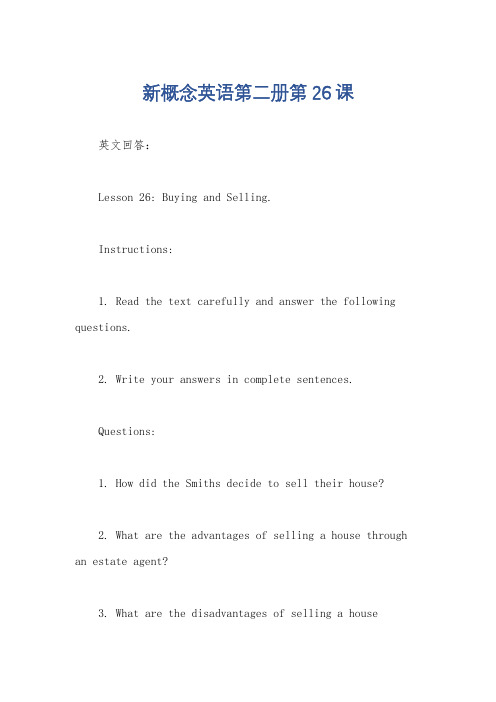
新概念英语第二册第26课英文回答:Lesson 26: Buying and Selling.Instructions:1. Read the text carefully and answer the following questions.2. Write your answers in complete sentences.Questions:1. How did the Smiths decide to sell their house?2. What are the advantages of selling a house through an estate agent?3. What are the disadvantages of selling a housethrough an estate agent?4. What are the advantages of selling a house privately?5. What are the disadvantages of selling a house privately?6. What are some tips for selling a house quickly?Answers:1. The Smiths decided to sell their house because they were moving to a larger home in a different neighborhood.2. The advantages of selling a house through an estate agent include:The agent has access to a large pool of potential buyers.The agent can help you price your home competitively.The agent can handle all of the paperwork and negotiations involved in the sale.3. The disadvantages of selling a house through an estate agent include:The agent will charge a commission, which can be a significant expense.The agent may not be as motivated to sell your home as you are.The agent may not be able to get you the best possible price for your home.4. The advantages of selling a house privately include:You can save money on the commission.You have more control over the sale process.You can sell your home more quickly.5. The disadvantages of selling a house privately include:You will need to have good marketing skills to attract potential buyers.You will need to be able to handle all of the paperwork and negotiations involved in the sale.You may not be able to get the best possible price for your home.6. Some tips for selling a house quickly include:Price your home competitively.Make your home appealing to buyers by decluttering, cleaning, and making necessary repairs.Market your home aggressively through online andoffline channels.Be prepared to negotiate with potential buyers.中文回答:第26课,买卖房屋。
新概念英语第二册 Lesson26 Lesson26 The best art critics

• ★pattern n. 图案 • ① n. 图案 • ② n. 模式, 典范 the same pattern
3. pretend
• 1).pretend to do sth.
• 2)pretend to be doing sth 假装正 在做。。。。。
黄菡
乐嘉
Critics(评论家)
• ★paint v. 画
• draw a picture 用线条画 • paint a picture 强调油画 • painting n. 画 • oil painting 油画 ;Chinese painting 中国
国画
• ★pretend v. 假装 • pretend to do sth. 假装…… • pretend to be doing sth 假装正在做。。。。。 • Anna pretended to be reading when Lucy
• 选出下列句子中可以用 if替换whether 的句子: • A.The news whether our team has won the
game is not known.
• B.The discussion focused on whether they would buy a new car.
upside down.
Critic, pretend, art, paint
B。生词学习---6分钟
• 8.appreciate v. 鉴赏 • 9.notice v. 注意到 • 10.whether conj. 是否
B。生词学习---6分钟
• 11.hang v. 悬挂,吊 • 12.critically adv. 批评地 • 13.upside down 上下颠倒地
新概念英语第二册Lesson26

paint • painter n. 画家,油漆工 • painting n. 画 oil painting 油画 Chinese painting 中国国 画
pretend v. 假装 • pretend to do sth.
她假装知道答案。
假装做......
She pretended to know the answer.
Lesson 26
New words
art • artist • artiste • arts • science n. 艺术 【U】 艺术家 ,画家 艺人 文科 理科
critic
n. 评论家 a literary critic
a music critic
• criticise
• critical
他问我:“你看过那部电影吗?” 他问我。He
asks me. I ever seen that film?
that if / wether
我看过那部电影吗? Have
He asks me if /wether I have ever seen that film?
He knows 不了现代艺术。
appreciate
• appreciate doing sth. 喜欢做......
I like... < I love... < I enjoy... < I appreciate...
notice • 1)v. 注意到 (细节上的注意,别人没注意到,你注意到了) • notice sb. do sth. pay attention to... • notice sb. doing sth. 思想上的注意 • notice + that 从句
新概念英语第二册课文全篇及翻译96篇
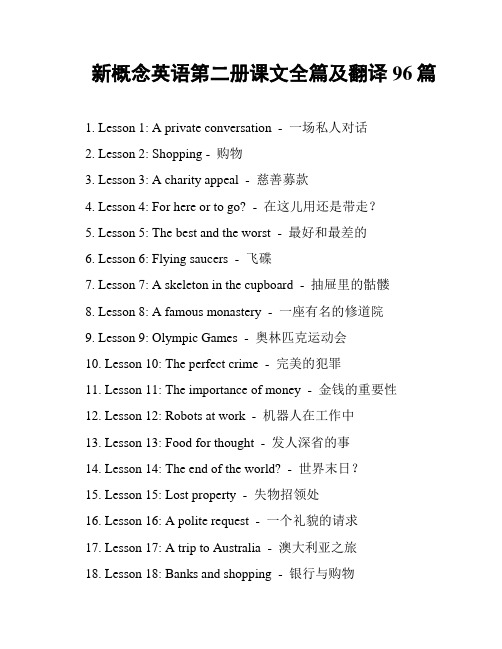
新概念英语第二册课文全篇及翻译96篇1. Lesson 1: A private conversation - 一场私人对话2. Lesson 2: Shopping - 购物3. Lesson 3: A charity appeal - 慈善募款4. Lesson 4: For here or to go? - 在这儿用还是带走?5. Lesson 5: The best and the worst - 最好和最差的6. Lesson 6: Flying saucers - 飞碟7. Lesson 7: A skeleton in the cupboard - 抽屉里的骷髅8. Lesson 8: A famous monastery - 一座有名的修道院9. Lesson 9: Olympic Games - 奥林匹克运动会10. Lesson 10: The perfect crime - 完美的犯罪11. Lesson 11: The importance of money - 金钱的重要性12. Lesson 12: Robots at work - 机器人在工作中13. Lesson 13: Food for thought - 发人深省的事14. Lesson 14: The end of the world? - 世界末日?15. Lesson 15: Lost property - 失物招领处16. Lesson 16: A polite request - 一个礼貌的请求17. Lesson 17: A trip to Australia - 澳大利亚之旅18. Lesson 18: Banks and shopping - 银行与购物19. Lesson 19: There's no smoke without fire - 无风不起浪20. Lesson 20: Long distance love - 远距离恋爱21. Lesson 21: A new house - 一所新房子22. Lesson 22: Nothing is impossible - 没有什么是不可能的23. Lesson 23: The Women's Institute - 妇女协会24. Lesson 24: The way to be happy - 幸福之道25. Lesson 25: China's treasures - 中国的宝藏26. Lesson 26: America's National Parks - 美国的国家公园27. Lesson 27: The benefits of laughter - 笑的好处28. Lesson 28: Travel - 旅行29. Lesson 29: Growing plants indoors - 室内种植植物30. Lesson 30: Tom's hobby - 汤姆的爱好31. Lesson 31: The invention of penicillin - 青霉素的发明32. Lesson 32: The Loch Ness Monster - 尼斯湖水怪33. Lesson 33: How to stop smoking - 如何戒烟34. Lesson 34: The Channel Tunnel - 海峡隧道35. Lesson 35: Memories - 回忆36. Lesson 36: The history of the Olympics - 奥运会的历史37. Lesson 37: Chance and opportunity - 机会与机遇38. Lesson 38: An unusual school - 一所不寻常的学校39. Lesson 39: Telepathy - 心灵感应40. Lesson 40: Motoring - 汽车运动41. Lesson 41: The Bank of English - 英语银行42. Lesson 42: Thw wind of change - 变革的风43. Lesson 43: My dream - 我的梦想44. Lesson 44: Secrets of the mind - 心灵的秘密45. Lesson 45: The Wadden Sea - 瓦登海46. Lesson 46: A trip into space - 太空之旅47. Lesson 47: Going into hospital - 进医院48. Lesson 48: Daredevils - 蛮勇的人49. Lesson 49: A new breed of car - 新一代的汽车50. Lesson 50: Arabian hospitality - 阿拉伯的好客51. Lesson 51: Peaceful uses of atomic energy - 和平利用原子能52. Lesson 52: A birthday present - 一份生日礼物53. Lesson 53: The coast of East Anglia - 东安格利亚海岸54. Lesson 54: Looking for a job - 找工作55. Lesson 55: Studying abroad - 出国留学56. Lesson 56: Poles apart - 截然不同57. Lesson 57: The story of silk - 丝的故事59. Lesson 59: Art and artists - 艺术和艺术家60. Lesson 60: Keeping the doctor away - 远离医生61. Lesson 61: The European Parliament - 欧洲议会62. Lesson 62: The early days of aviation - 航空的早期日子63. Lesson 63: Sleep and health - 睡眠与健康64. Lesson 64: Beyond the Milky Way - 银河系之外65. Lesson 65: Settling down - 定居下来66. Lesson 66: Astronomical discoveries - 天文学的发现67. Lesson 67: Curiosity - 好奇心68. Lesson 68: Making an emergency landing - 进行紧急降落69. Lesson 69: Power for the future - 未来的动力70. Lesson 70: The Bald Piano Player - 秃头钢琴家71. Lesson 71: A difficult customer - 一个难对付的顾客72. Lesson 72: The Olympic Games - 奥林匹克运动会73. Lesson 73: The world's worst singer - 世界上最糟糕的歌手74. Lesson 74: Just a holiday - 只是一次假期75. Lesson 75: Home sweet home - 甜蜜的家76. Lesson 76: A famous clock - 一个著名的时钟77. Lesson 77: False money - 假币78. Lesson 78: The United Nations - 联合国79. Lesson 79: Changing attitudes - 态度的转变80. Lesson 80: Cultural exchanges - 文化交流82. Lesson 82: Television and radio - 电视和广播83. Lesson 83: Marriage - 婚姻85. Lesson 85: Danger - men at work - 危险 - 男人在工作86. Lesson 86: Saving electricity - 节约用电87. Lesson 87: A close shave - 惊险时刻88. Lesson 88: Music - the universal language - 音乐 - 普遍的语言89. Lesson 89: Space pioneers - 太空先驱者90. Lesson 90: House-warming - 乔迁之喜91. Lesson 91: Toys - 玩具92. Lesson 92: Dear George - 亲爱的乔治93. Lesson 93: Growing old - 变老94. Lesson 94: What's in a name? - 名字有什么重要?95. Lesson 95: The dance of the hens - 鸡的舞蹈96. Lesson 96: A pretty carpet - 一块漂亮的地毯。
新概念英语第二册第26课Thebestartcritics_最佳艺术评论家

② vt.&vi 垂下 eg. John was very tired. He sat in a chair and hung (down) his head. ③ vt.&vi安装……使能转动/摆动 Have you hung the door? 你把门装上了吗?
★upside down 上下颠倒地 ① 上下颠倒 When he stands on his head, everything appears upside down to him. ② 乱七八糟,混乱不堪 My little boy always makes the room upside down. These men have made the whole country upside down.
eg. We appreciate your efforts(努力)for the development of the company. 我们感激你对公司发展所作的努力。 I greatly appreciate your timely(及时地) help. 我非常感谢你们的及时帮助。
★notice 1. 作名词,意为"布告,公告,启事",是可数名词。 如: There is a notice on the office gate saying "No Parking". 办公室门口上贴着一张"禁止停车"的告示。 2.作名词,意为"通知,预告,警告",是不可数名 词。如: These rules can't be changed without notice. 这些规则不预先通知不可以随便更改。
5、'It's all right,' she said, 'but isn't it upside down?' 【结构分析】Isn’t it upside down? = It’s upside down. 否定疑问句,没有否定的意 思,起肯定作用,起强调作用,表达一种 情绪 Aren't you lucky? 你真幸运 Isn't it a good idea ?
新概念第二册第26课 Lesson26

hang — hung — hung The coat was hung.
hang — hanged — hanged The thief was hanged.
v. 绞死, 吊死
★hang
v. 挂断
Don't hang up = Hold on.
hang around 混在一起 以前我总和不好的人混在一起
critical adj. 挑剔的 You are critical.
★paint v. 画 draw a picture 用线条画
paint a picture 强调油画 painting n. 画 oil painting
Hale Waihona Puke ★pretend v. 假装 pretend to do sth. 假装…… When his mother came in, the baby pretended to go to sleep. pretend that +从句假装……
★appreciate v. 鉴赏 appreciate sth. 感激…… I appreciate your help. 我很感激你的帮助 appreciate doing sth. 我很喜欢做某事 I like… I love… I enjoy… I appreciate… (程度一个比一个深)
★art n. 艺术
art student 艺术系的学生 artist n. 艺术家
artiste n. 艺人
★critic
n. 评论家
criticise v. 批评, 批判(主要指批判, 但不完 全是责备的意思) He criticised my painting. criticism n. 批评, 批判
新概念英语第二册Lesson__26

check your answers
• The writer studies art and he paints a lot of pictures.Many people don't really understand modern art.Paintings don't always have a meaning.They are sometimes pretty patterns.Young children not only appreciate modern paintings better than others but they notice more.The writer's sister went into his room yesterday and she examined his new picture.He hung it upside up and she noticed this immediately.
listen again,and read after it • open your book, ask me questions.
• open your book, underline something important
1-5. adcba 6-10. ddabd 11-12. bd
Worห้องสมุดไป่ตู้s study
Does the writer study art, or does he study music? Does he paint a lot of pictures or not? (and ) Do many people really understand modern art or not? Do paintings always have a meaning or not? Are they sometimes pretty patterns or not? Do young children appreciate modern paintings better than others or not? Do they notice more or not? (not only…but) When did the writer’s young sister go into his room? Did she examine his new picture or not? (and) Had he hung it upside down, or had he hung it the right way up? Did she notice this immediately or not? (and)
新概念英语第二册课后习题答案详解26-30

新概念英语第二册课后习题答案详解Lesson 261. a根据课文第3行Of course, many pictures are not aboutanything(当然,有很多画是什么“意思”也没有的),只有a. You can’t always ‘explain’modernpictures(你是往往不能解释现代画的含义的)最能表达作者暗示的意思,而其他3个选择都不是作者的想法。
2. d根据课文的最后两行‘It’s all right,’ she said, ‘but isn’t it upside down?’ Ilooked at it again. She was right! It was! 只有d. noticed(注意到)最符合课文实际内容,其他3个选择都与事实不符。
3. c本句是陈述一个事实,应该用一般现在时。
谓语动词pretend 是一般现在时,它后面的宾语从句也应该是一般现在时。
a.understood 是过去时,不符合语法;b. are understanding 是现在进行时,understand是一个表示状态的动词,这种动词一般不用进行时形式;d. understands是一般现在时,只能用于第3人称单数,而本句的主语是They; 只有c. understand 是一般现在时,符合时态要求。
4. ba. what is it about 的语序不对,在间接因语中应该用陈述句语序;c. what about it is ,d. what about is it 语序混乱,意思不通。
只有b. what it is about 符合间接引语的语序,所以选它。
5. c因为在间接引语中和一般疑问句应该用if或whether 引导,句中采用陈述句语序。
a. weather(天气)是错误的,意思不对。
b. that , d. unless都不能引导间接引语中的疑问句,只有c. if 能引导间接疑问句,所以选c.6. da. a new 有语法错误,应该将冠词去掉才对;b. one new 不正确,形容词new 应该放在one 前面;c. newone 也不够正确,因为前面缺少冠词a; 只有d. a new one 最符合语法,因此应该选d.7. d本句中缺少一个系动词,因为句中的right(对的)是形容词做表语。
新概念英语第二册26课课件
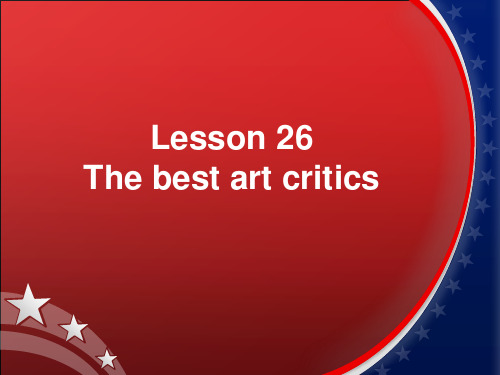
The Text
2. We like them in the same way that we like pretty curtain material.
【语言点】 pretty curtain material_漂__亮__的__窗__帘__布__ in the same way that =a_s__…__正__如__…__…_ 一样 in a way_以__某__种__方__式____
课文解析
The Text
1. Many people pretend that they understand
modern art.
【语言点】 • pretend to do sth. __假__装___…_…________ e.g. When his mother came in, the baby pretended
The Text
2. We like them in the same way that we like pretty curtain material.
【拓展】
• the same的用法 1. __同__样__的__人__;_同__样__的__事__物_____
e.g.His birthday and hers are the same. 2. 单__独__用__t_h_e__sa_m__e_,__可__指__刚__提__到__过__的__同__一__个__人__或__事物
The Text
2. We like them in the same way that we like pretty curtain material.
新概念英语第二册:第26课课文详解及语法解析
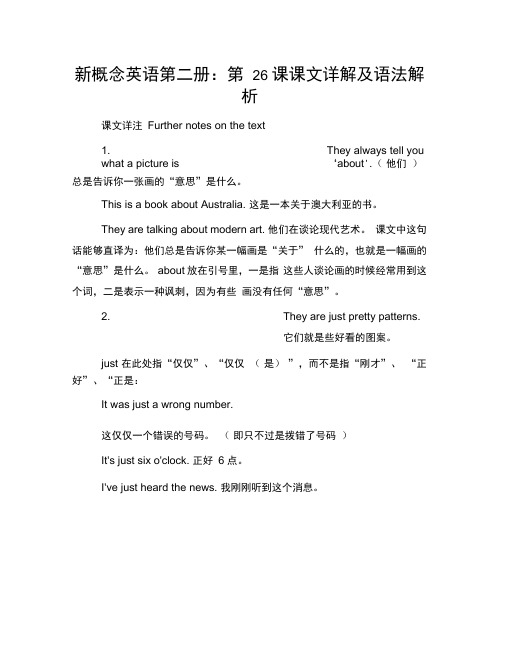
新概念英语第二册:第26 课课文详解及语法解析课文详注Further notes on the text1. They always tell youwhat a picture is ‘about'.(他们)总是告诉你一张画的“意思”是什么。
This is a book about Australia. 这是一本关于澳大利亚的书。
They are talking about modern art. 他们在谈论现代艺术。
课文中这句话能够直译为:他们总是告诉你某一幅画是“关于” 什么的,也就是一幅画的“意思”是什么。
about 放在引号里,一是指这些人谈论画的时候经常用到这个词,二是表示一种讽刺,因为有些画没有任何“意思”。
2. They are just pretty patterns.它们就是些好看的图案。
just 在此处指“仅仅”、“仅仅(是)”,而不是指“刚才”、“正好”、“正是:It was just a wrong number.这仅仅一个错误的号码。
(即只不过是拨错了号码)It's just six o'clock. 正好6 点。
I've just heard the news. 我刚刚听到这个消息。
3. We like them in the same way that we like pretty curtain material. 我们喜爱它们就像我们喜爱漂亮的窗帘布一样。
in the same way that/as 是个连接短语,用于表示比较,可译为“像/和........... 一样”:She walks in the same way that/as her sister did.她的走路姿势和她姐姐以前走路的姿势一模一样。
4.I think that young children often appreciate modern pictures better than anyone else. 我觉得小孩子们往往比任何人都更能欣赏现代绘画。
新概念英语第二册Lesson26Thebestartcritics
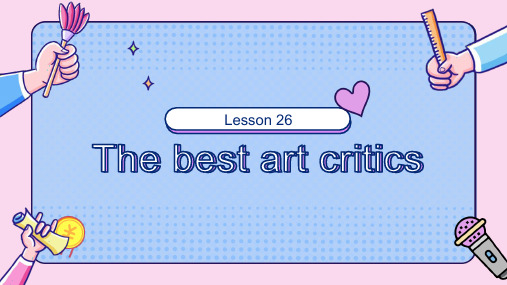
Check the answers
1.Who is the student's best critic? His seven-year-old sister.
2.Does the writer learn art? Yes, he does.
Language points
that引导的宾语从句
1.Many people pretend that they understand modern art. They always tell you what a picture is 'about'. what引导的宾语从句 很多人装成很懂现代艺术的样子。他们总告诉你一幅画的"意 思"是什么。
curtain /ˈkɜːt(ə)n/ n. 窗帘 pattern /ˈpæt(ə)n/ n.图案 The curtains had a floral (花朵的)pattern.
Stone began to be used as a roofing material.
material / 宾语2
我的妹妹只有7岁,但她总能说出我的画是好还是坏。
(1)tell sb.sth. 告诉某人某事 (2)whether 引导的宾语从句,与or not连用。
Language points
4. 'I'm hanging this picture on the wall,' I answered. 'It's a new one. Do you like it?' "我正把这画儿挂到墙上去。"我回答 说,"这是幅新画,你喜欢吗?引"号的位置在句尾其他标点的外面。
新概念英语第二册听力及翻译Lesson26
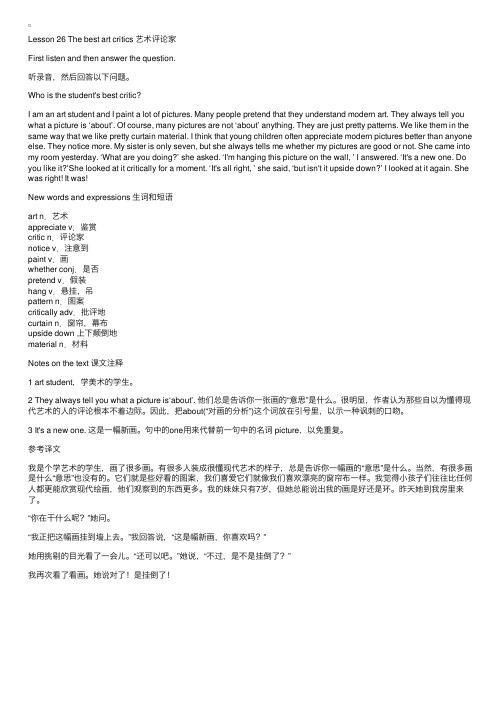
Lesson 26 The best art critics 艺术评论家First listen and then answer the question.听录⾳,然后回答以下问题。
Who is the student's best critic?I am an art student and I paint a lot of pictures. Many people pretend that they understand modern art. They always tell you what a picture is ‘about’. Of course, many pictures are not ‘about’ anything. They are just pretty patterns. We like them in the same way that we like pretty curtain material. I think that young children often appreciate modern pictures better than anyone else. They notice more. My sister is only seven, but she always tells me whether my pictures are good or not. She came into my room yesterday. ‘What are you doing?’ she asked. ‘I'm hanging this picture on the wall, ’ I answered. ‘It's a new one. Do you like it?’She looked at it critically for a moment. ‘It's all right, ’ she said, ‘but isn't it upside down?’ I looked at it again. She was right! It was!New words and expressions ⽣词和短语art n.艺术appreciate v.鉴赏critic n.评论家notice v.注意到paint v.画whether conj.是否pretend v.假装hang v.悬挂,吊pattern n.图案critically adv.批评地curtain n.窗帘,幕布upside down 上下颠倒地material n.材料Notes on the text 课⽂注释1 art student,学美术的学⽣。
- 1、下载文档前请自行甄别文档内容的完整性,平台不提供额外的编辑、内容补充、找答案等附加服务。
- 2、"仅部分预览"的文档,不可在线预览部分如存在完整性等问题,可反馈申请退款(可完整预览的文档不适用该条件!)。
- 3、如文档侵犯您的权益,请联系客服反馈,我们会尽快为您处理(人工客服工作时间:9:00-18:30)。
新概念英语第二册听力及翻译Lesson 26
Lesson 26 The best art critics 艺术评论家
First listen and then answer the question.
听录音,然后回答以下问题。
Who is the student's best critic?
I am an art student and I paint a lot of pictures. Many people pretend that they understand modern art. They always tell you what a picture is ‘about’. Of course, many
pictures are not ‘about’ anything. They are just pretty patterns. We like them in the same way that we like pretty curtain material. I think that young children often appreciate modern pictures better than anyone else. They notice more. My sister is only seven, but she always tells me whether my pictures are good or not. She came into my room yesterday. ‘What are you doing?’ she asked. ‘I'm hanging this picture on the wall, ’ I answered. ‘It's a new one. Do you like it?’She looked at it critically for a moment.
‘It's all right, ’ she said, ‘but isn't it upside down?’ I looked at it again. She was right! It was!
New words and expressions 生词和短语
art n.艺术
appreciate v.鉴赏
critic n.评论家
notice v.注意到
paint v.画
whether conj.是否
pretend v.假装
hang v.悬挂,吊
pattern n.图案
critically adv.批评地
curtain n.窗帘,幕布
upside down 上下颠倒地
material n.材料
Notes on the text 课文注释
1 art student,学美术的学生。
2 They always tell you what a picture is‘about’. 他们总是告诉你一张画的“意思”是什么。
很明显,作者认为那些自以为懂得现代艺术的人的评论根本不着边际。
所以,把about(“对画的分析”)这个词放在引号里,以示一种讽刺的口吻。
3 It's a new one. 这是一幅新画。
句中的one用来代替前一句中的名词 picture,以免重复。
参考译文
我是个学艺术的学生,画了很多画。
有很多人装成很懂现代艺术的样子,总是告诉你一幅画的“意思”是什么。
当然,有很多画是什么“意思”也没有的。
它们就是些好看的图案,我们喜爱它们就像我们喜欢漂亮的窗帘布一样。
我觉得小孩子们往往比任何人都更能欣赏现代绘画,他们观察到的东西更多。
我的妹妹只有7岁,但她总能说出我的画是好还是环。
昨天她到我房里来了。
“你在干什么呢?”她问。
